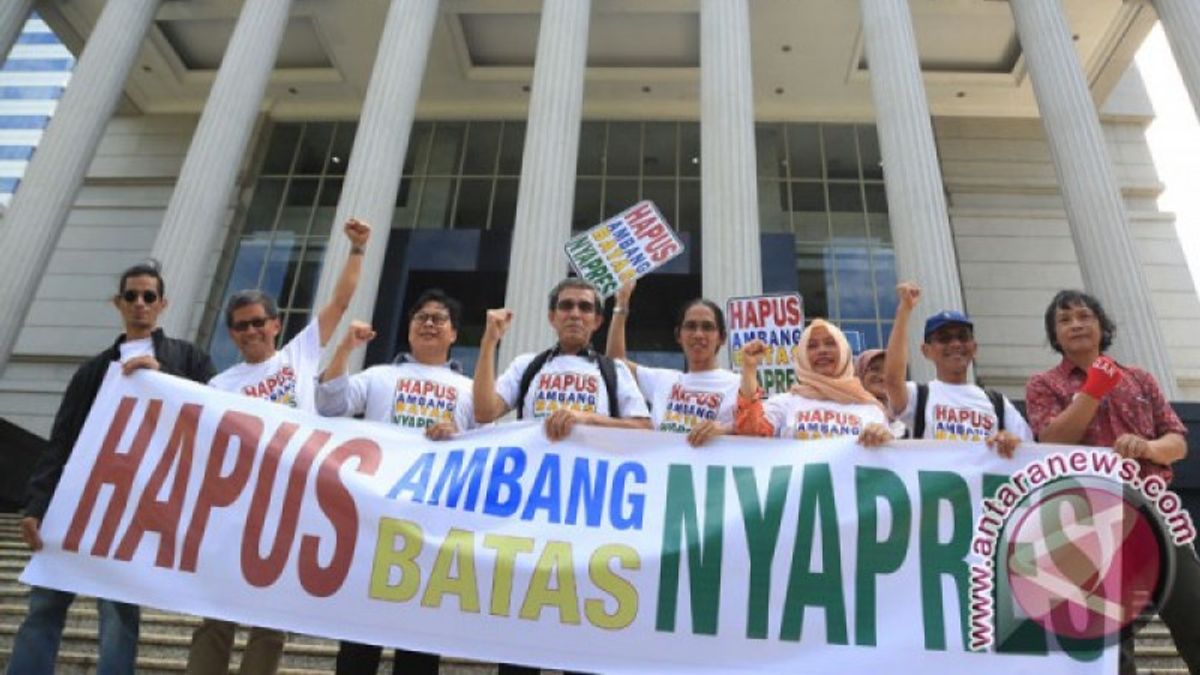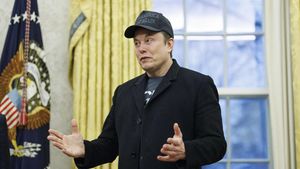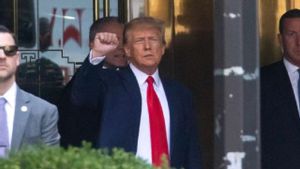JAKARTA - Candidate Pairs are proposed by Political Parties or Combined Election Contesting Political Parties that meet the requirements for obtaining seats of at least 20% (twenty percent) of the total seats in the DPR or obtaining 25% (twenty five percent) of the nationally valid votes in the general election. previous parliament.
That is Article 222 of Law Number 7 of 2017 concerning General Elections (State Gazette of the Republic of Indonesia of 2017 Number 182, Supplement to the State Gazette of the Republic of Indonesia Number 6109). Or familiarly referred to as the presidential threshold provisions for the General Election.
Many political figures, the Indonesian diaspora in other countries, have asked the ASN for a judicial review of the article, but the Supreme Court has not budged. The answers given are usually related to the legal considerations of Article 6A paragraph (2) of the 1945 Constitution that pairs of presidential and vice presidential candidates can only be proposed by a political party or coalition of political parties participating in the general election.
Thus, legal subjects who have constitutional rights to apply are political parties or coalitions of political parties. Also, individual citizens who have the right to be elected and supported by political parties or coalitions of political parties participating in the General Election to nominate themselves or be nominated as pairs of presidential and vice presidential candidates.
"If applicant one is indeed supported by a political party or a combination of political parties participating in the election within reasonable reasoning limits, applicant one should show that evidence to the court." This is Constitutional Justice Arief Hidayat's answer to the lawsuit filed by the former Coordinating Minister for Maritime Affairs Rizal Ramli on January 14, 2021, as reported by kompas.com.

Similar to the answer from the Chairman of the Constitutional Court Anwar Usman when responding to the request for judicial review of the Chairman of the Regional Representatives Council (DPD) La Nyalla Mattalitti on Thursday 7 July 2022. "DPD or Petitioner 1 does not have the legal standing to apply for the presidential threshold."
On the same occasion, Anwar also refuted the main application of the UN General Chair Yusril Ihza Mahendra who thought Article 222 of the Election Law was contrary to the principle of the rule of law so that the president was directly elected by the people, and periodic elections as regulated in Article 1 paragraph (3), Article 6A paragraph (1), and Article 22E paragraph (1) of the 1945 Constitution.
The UN does not meet the requirements for voting in parliament. Only 1,099,849 or equivalent to 0.79 percent in the previous election, but according to the provisions of Article 6A paragraph (2) of the 1945 Constitution, the United Nations still has the right to nominate presidential and vice presidential candidates.
Anwar still decided, "The principal petition of Petitioner II (Yusril) is groundless according to law."
In reading the verdict of case Number 52/PUU-XX/2022 which was broadcast by the Court virtually in Jakarta on July 7, 2022, Anwar stated, "The petition of Petitioner I (La Nyalla) cannot be accepted, and rejects the application of Petitioner II (Yusril) in its entirety. ."
What's wrong with the Constitutional Court?Writer and activist from the Student Political Bloc, Delpedro Marhaen, assessed that the Constitutional Court's rejection of the presidential threshold provision was far from burning with the current political reality of Indonesia.
In the view of the Constitutional Court, the nomination threshold requirement is needed to prioritize the relationship between the president and vice president and the DPR, so that it will encourage the effectiveness of the political processes in the DPR to be simpler and more efficient within the framework of proportional checks and balances. In reality, there is no relationship between effectiveness and threshold.
“Reflecting on the 2019 election, the threshold does not create effective politics, even the parties that carry the losing President and Vice President eventually move closer to the winners. This results in an unhealthy political system because it eliminates the dynamics in deciding policies. In the end, the resulting policy only smoothes the trickery of stakeholders," Delpedro wrote as read by Constitutional Law expert Refly Harun on his YouTube account, Sunday (17/7).
According to Delpedro, today's political reality shows the broken relationship between the executive and the legislature. The presidential and parliamentary institutions often conspire rather than fight in issuing bad laws and making fun of public reason.
The choice of effective and efficient sentences in the presidential system from the perspective of the Constitutional Court, is more closely related to the color of authoritarian government, where parliament only functions as a stamp for presidential maneuvers rather than supervising and correcting power.
"It's no wonder that the candidates for political parties are the only ones. Even though we have the right to vote, it is the political parties that determine who we can vote for; This indicates that the circulation of candidates is indeed held by political elites who control an efficient presidential system,” Delpedro continued.

Constitutional Law expert Refly Harun is not much different. He questioned the essence of the Constitutional Court in maintaining the strengthening of the current presidential threshold. In fact, the presidential threshold of only zero percent of the government can still run effectively.
"After all, at zero percent does not mean the president will not be supported. It is impossible for a winning president not to be supported by the power of a political party. Because consciously, we will see that the winner will not possibly be a stepdaughter. The winner is always the golden child who is always sought after," said Refly on his YouTube account, Sunday (17/7).
“So, there really is no correlation between the presidential system and the strengthening or support of the president in order to achieve effective and efficient politics. Then why does the Constitutional Court still maintain the presidential threshold? I don't know exactly,” he continued.
In this case, the Court does not appear to be independent. Refly suspects that the rejection is not only a matter of law or constitutional arguments, but is mixed with other issues. "It could be that the pressure of the oligarchs is impossible, the pressure of the palace is very possible, or the gesture of power is very possible."
Of the 9 constitutional judges, only 2 judges persisted in rejecting the 20 percent presidential threshold. In fact, said Refly, the dissenting opinions of the two are far more complete, comprehensive and argumentative compared to what the Chief Justice of the Constitutional Court narrated in the decision to reject the case.

“I know most of the judges or all of the judges, who I consider to be fairly independent judges. In fact, in this case, I said that the judges were truly devoted to power and did not want to see our democracy develop properly,” said Refly.
However, it has developed as developed in the style of President Jokowi's regime since 2014, namely the tendency to narrow the presidential election into a circuit that can only be followed by the pair of candidates they choose.
“There is a threshold of 20 percent, not only on the paper, there are no rules, but above low in action, in reality it also brings bad things that the Constitutional Court itself admits, only the Court avoids. If it is granted, he said, it will not necessarily eliminate the oligarchy, there is no guarantee. Well, the task of the Constitutional Court is to uphold the constitution, not to guarantee that constitutional provisions will be implemented or not by state authorities, because that is a different system," said Refly.
He hoped that the Constitutional Court could truly be independent, non-partisan and only see the constitution as its lord. "We just pray, because nothing is impossible from the almighty," he said.
Zero Percent Actually Makes NoiseA different opinion was expressed by an expert on constitutional law, Agus Rikwanto. Although the 20 percent threshold is considered by some to be burdensome, he believes that this regulation can balance the power of the president and the DPR. Unlike the Legislative Election in 2004.
At that time, tickets for RI-1 and RI-2 seats were contested by five pairs of presidential and vice presidential candidates. Susilo Bambang Yudhoyono (SBY) who was then paired with Jusuf Kalla (JK) managed to walk into the palace with the support of three small political parties, namely the Democratic Party, the Crescent Star Party (PBB), and the Indonesian Justice and Unity Party (PKPI). Although both of them managed to get 60.62 percent of the national vote over the pair Megawati Soekarnoputri and Hasyim Muzadi, the political parties carrying SBY-JK did not have a stake in the DPR.
“There is an unfavorable dynamic with the parliament, because SBY is only supported by three political parties, while the major political parties, including the election winners, are in parliament. This makes the SBY-JK government giddy and there is often a deadlock between the President and the DPR. Starting from this incident, the presidential threshold began to increase the percentage of votes, "said Dr. Agus Rikwanto was quoted from uns.ac.id, Monday (18/7).
“If you want to change this, you don't need to go to the Constitutional Court to test it, the way the law wants to change is the article that changes the President and the DPR. The problem is that both of them have agreed not to change the Election Law,” he added.
Launching from Sindonews, the Chairperson of the PDIP DPP for Election Winning, Bambang Wuryanto also joked about what political conditions would be if the zero percent presidential threshold was applied. According to him, there will be chaos because any party can nominate its presidential candidate.
"If it's zero percent (threshold), anyone can nominate president. If everyone can nominate president, how noisy this republic is, that's one. Yes, you can nominate president, so the 0% proposal can make a lot of noise," he said. .
Indirectly, Bambang also acknowledged that the party with a large vote should send a presidential candidate. Otherwise, the government will not run smoothly because there is no support from parliament. Indeed, in the ratification of laws, the government and the DPR must have one voice.

Political observer from UI, Panji Anugerah Permana assessed that the presidential threshold provision was born as a system to build a better presidential system. The initial goal is to change the political dynamics so that minority government does not happen again, disharmony between the executive and legislature.
As happened in the era of President Gus Dur and President SBY. “Gus Dur and SBY have indeed succeeded in becoming presidents. However, the votes of their supporting political parties lost in parliament. As a result, there are often conflicts between the executive and the legislature,” he said when contacted on Monday (18/7).
However, what is currently happening, the relationship between the executive and the legislature is too harmonious. So, there are no checks and balances. “As long as Jokowi is President, there is almost no opposition from the legislature. It's not even healthy," he said.
As a result, said Panji, one way to balance these conditions in the 2024 General Election is to lower the threshold percentage. "There are no standards. However, if you look in the mirror in foreign countries, the range is 4-5 percent. Don't make it zero percent because the tendency for noise is getting higher," he said.
"That is for the presidential election. It is different from the regional elections. In the regional elections, parties that have seats in the DPR may nominate candidates in order to create a balance," concluded Panji.
The English, Chinese, Japanese, Arabic, and French versions are automatically generated by the AI. So there may still be inaccuracies in translating, please always see Indonesian as our main language. (system supported by DigitalSiber.id)













